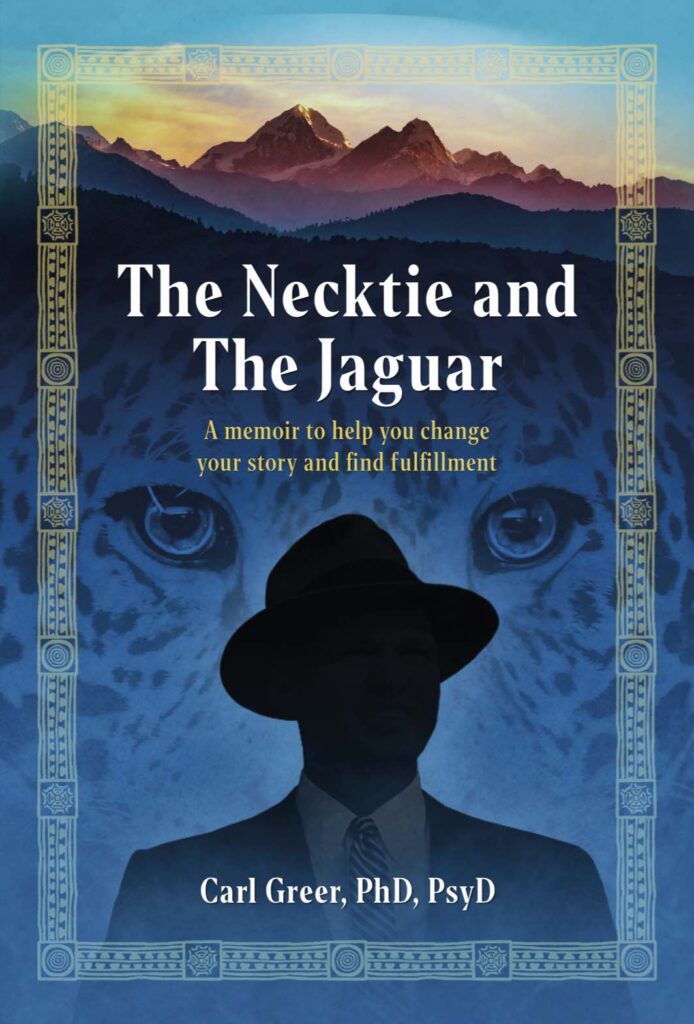Reflecting on The Necktie and The Jaguar
What is the value of self-reflection? I have thought a lot about that lately as I’ve completed and just published my newest book The Necktie and The Jaguar: A Memoir to Help You Change Your Story and Find Fulfillment. It’s what I call an interactive memoir: In addition to writing my own story, I have included questions for the reader to inspire self-reflection.
When I was growing up in the Midwest in the years after World War II, contemplating why you were who you were and acted as you did was not highly valued. Pondering the big questions of life such as, “Why are we here?” and “Did we exist somewhere, before we were born?” that spoke to what I call my mythopoetic self would make you seem impractical, even odd. Spirituality wasn’t a topic of conversation, even though most people I knew, myself included, attended church. Like many people, I chose a practical path and walked it steadily, that is, until my mythopoetic self—my soul, you might say—was so frustrated by the starvation diet I’d kept it on that it cried out for nourishment. My transformation from businessman to clinical psychologist and Jungian analyst, shamanic practitioner, and philanthropist began in midlife, as so many transformation stories do. I had achieved success according to how my family and the people around me defined it, so why was I so restless and dissatisfied?
In my memoir, I challenge you to look back at your own life, the choices you made, and the way you’ve framed your experiences. The stories we tell about what our lives have been, are, and probably always will be are often hidden from our awareness and powerfully influencing our lives today. People often declare that they’re seeking to make changes but wonder why it’s so difficult to discard old habits and break way from old patterns. It was undergoing Jungian analysis, which was required for me to become a Jungian analyst, that first nudged me into looking at myself and my life honestly. Dreams, some shamanic journeys I undertook at the time, and work I did in analysis opened my eyes to much that I’d been unaware of until then. I’d figured that undergoing analysis would be helpful for my future work with clients and had no inkling that I had unresolved issues of my own. Analysis wasn’t always comfortable, but I could see it was helping me find a new path for myself and to feed my soul before it began to feed on me. I came to understand that repressing my deepest desires to live a life of meaning and purpose, leaving unexplored the questions that had intrigued me in my youth, was constricting me emotionally. In the years to come, I would discover that I had been energetically constricted, too, and would wonder if the heart troubles I developed were influenced by years of denying myself emotional and spiritual freedom.
Carl Jung once wrote, “Man needs difficulties; they are necessary for health.” I studied shamanism in my sixties and became trained in shamanic techniques. That led me to climb high into the Andes to perform rituals with indigenous Q’ero shamans and be transported to a hut on the banks of the Mother of God River, where the Amazon begins, to ingest sacred plants that facilitate shamanic journeying. These activities would not have met with some of my physicians’ approval. But I felt a strong calling to explore my spiritual nature and my relationship to what I call Source. I had no trouble with my heart despite the physical rigor of the journey, and now, two decades later, I continue that exploration and apply the lessons I’ve learned to how I live my daily life. I’ve had bypass surgery, and radiation treatment for prostate cancer, but I continue to benefit from years of doing martial arts to manage stress and keep fit—and I also believe my forays into spirituality, shamanism, and hidden realms where I’ve encountered healing energies have helped me to thrive into my 80s. Now I’m in a stage of giving back—through funding and working with charities, many of which serve people who haven’t had some of the advantages I have.
Maybe all those years of trying to burn out my mythopoetic self and be practical had a payoff: I’ve felt the need to consider the real-life value of my shamanic adventures and my explorations of my unconscious and the transpersonal realms that Jung would say were part of the collective unconscious. I’ve looked at what happened to me while undergoing shamanic journeys, and inexplicable synchronicities that happened in my everyday life, and asked myself, how can this help me live a life of greater health, well-being, fulfillment, and purpose? I’ve looked, too, at challenges I’ve faced and painful experiences, such as losing my mother unexpectedly when I was a young boy, and asked myself, how have these events affected me? And are there ways I can change how the memories live within me so I am more conscious of the story of my life I’m writing today that may shape what I experience tomorrow?
I hope that by reading and working with the questions in The Necktie and The Jaguar, you’ll start to free yourself from any unnecessary constrictions that have kept you from living a more satisfying life. My wish is that my memoir will help you to nourish that adventurous inner self that yearns for more and is willing to dream a new dream for yourself and bring it to life.
The Necktie and The Jaguar was published by Chiron Publications in hardcover, paperback, and eBook editions and is available at Amazon, Barnes and Noble, and bookstores everywhere.

